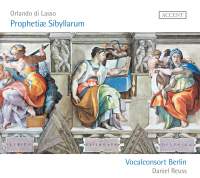Texte paru dans: / Appeared in: |
|
|
Outil de traduction ~ (Très approximatif) |
|
|
Reviewer: J.
F. Weber One of the most familiar major works of Orlandus Lassus (1532–1594), the Sibylline Prophecies were last heard from the Brabant Ensemble (Fanfare 35:3), an exceptional disc for its playing time half again as long as the present issue, its addition of the first recording of a Mass, and a different Magnificat than this one, as well as three motets different than the four heard here. Reuss’s program is unified by the Christmas mystery, for these prophecies of antiquity were interpreted in Christian times as prophecies of the coming of the Redeemer. The motets all belong to the Christmas season, and Psalm 109 (110) was interpreted in New Testament times as a Messianic prophecy. The Magnificat (following on the motet Ave Maria) was Mary’s response to the announcement that she would be the mother of the Redeemer, explaining why Bach performed his masterly setting for the first time on Christmas 1723. The main work here, like the whole program, is unacccompanied; an earlier version (before the Brabant Ensemble) by Manfred Cordes (33:6) added instruments. The Magnificat is a parody of an Easter hymn for 10 voices. The notes by Bernhard Schrammek provide a lucid and informative summary of Lassus’s life and a commentary on all the works heard here. The performances are excellent and the program well organized, but the disc suffers by comparison with the more generous Brabant CD. On its own terms, this is well worth hearing. | |
|
|
|
|
Cliquez l'un ou l'autre
bouton pour découvrir bien d'autres critiques de CD |
|




